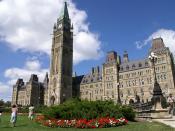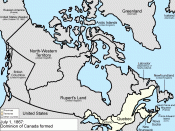The Official Languages Act, of 1969, officially recognized Canada as a bilingual country. Although it is acknowledged that the French and English languages hold equal status, bilingualism is often resented. This is because it tends to be viewed by English speaking Canadians as special status treatment to appease French-Canadians who sought greater autonomy once.
The 1960's were filled with political unrest as Quebeckers toyed with the concept of separation. Trudeau was confronted with the task of keeping Canada together as a united nation. Francophone's were not exclusive to Quebec. Significant numbers resided in Atlantic Canada and Ontario, more specifically near the Quebec border. In addition, the Prairie Provinces and to some extent British Columbia, also possessed a Métis population that still spoke French. The issue at the time was that many of these individuals supported national unity and were anxious about their future should Quebec separate.
Resolve came in 1969 with Trudeau's Official Languages Act (OLA), recognizing French and English as Canada's official languages.
It is important to note that at the time, the point of the OLA was not to shove French onto everyone, but instead to ensure that both French and English Canadians had access to federal services in their own language. Consequently, federal government agencies across Canada were required to provide services in both languages and more French-Canadians were appointed to senior federal government positions. So why then should there be any resentment?
With its passing the OLA infuriated "...some English-speaking Canadians who preferred to think of Canada as an English country with a French-speaking minority, and not as a country in which both language groups enjoyed equal status."1 Clearly these individuals resented French being shoved down their throats, and the fact that a great deal of money was being spent on implementing programs in places where...


